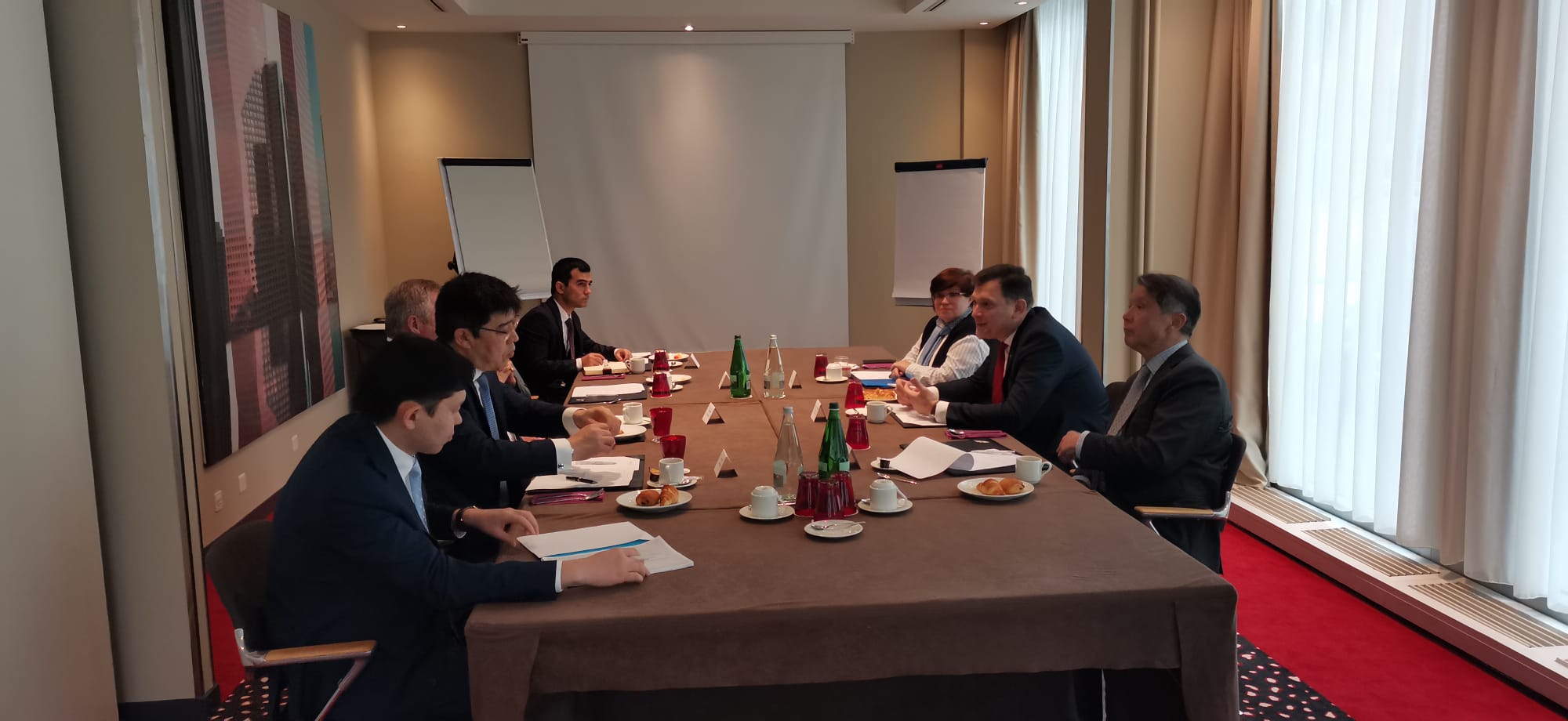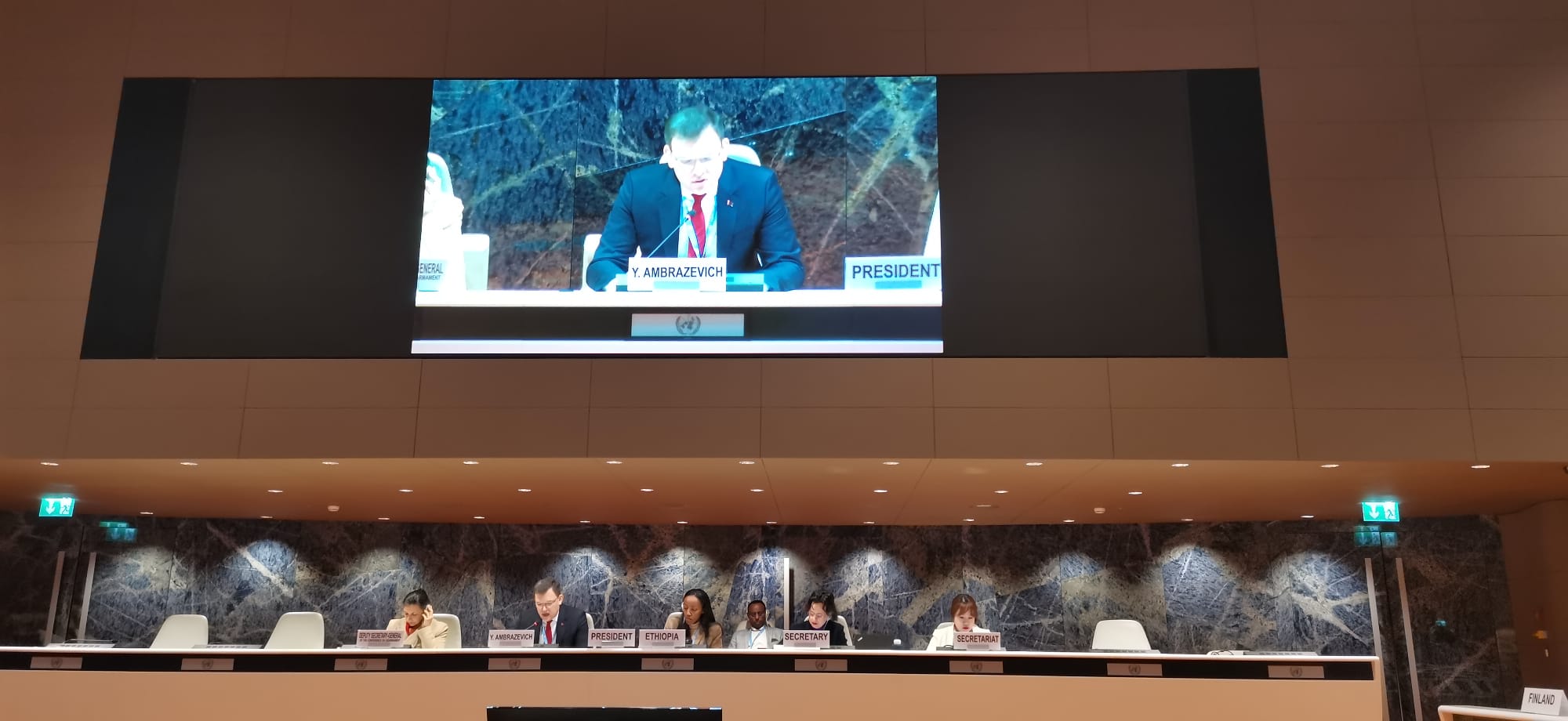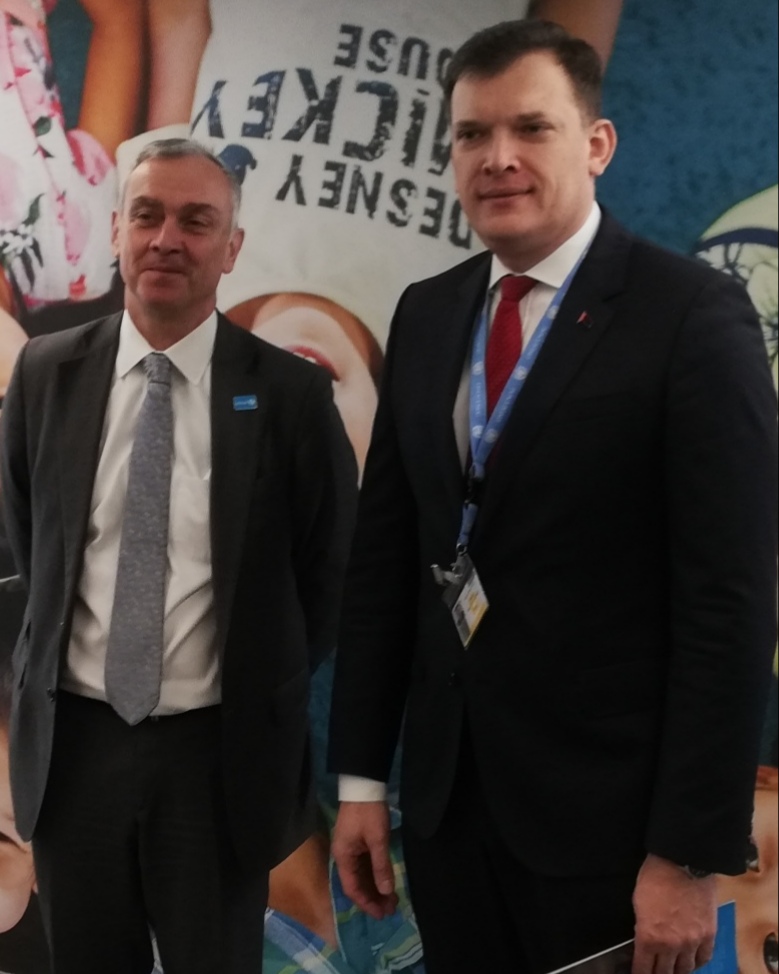On the visit of Deputy Minister of Foreign Affairs of Belarus Yury Ambrazevich to Geneva to participate in high-level UN events (day 2)
01.03.2023On February 28, 2023, Deputy Minister of Foreign Affairs of the Republic of Belarus Yury Ambrazevich met with the heads of delegations and Permanent Representatives of the CSTO member states in Geneva.

The Deputy Minister briefed the participants of the meeting in detail on the plans and priorities of the Republic of Belarus as the country presiding over the Collective Security Treaty Organization this year.
The Belarusian representative stressed that coordinated political and diplomatic activity remains the most important tool for solving the problems of ensuring collective security in the CSTO format.
In this regard, among the priorities and plans of the Belarusian presidency in the CSTO in 2023, an important place is occupied by strengthening its role and significance in the system of international relations in order to match the activities of the organization to the context of regional and global security.
The meeting participants discussed a number of practical aspects related to the positioning of the Collective Security Treaty Organization in relevant international organizations and forums.
During the meeting, there was also an exchange of views on the state of affairs on the multilateral disarmament platforms. The prospects for practical interaction between the CSTO members on key issues of the international security agenda were discussed.
On February 28, 2023 Deputy Minister of Foreign Affairs of the Republic of Belarus Yury Ambrazevich addressed the High-level Segment of the Conference on Disarmament with the following statement.

“On March 22, in less than a month, Belarus will commemorate a mournful date: 80 years of destruction of the village, which name, Khatyn, became a symbolic name for more than 600 Belarusian villages burned down together with their inhabitants during the Second World War. Our memory is a tribute to the victims of the genocide committed by the army of Nazi Germany and the soldiers of a number of other European states against the Belarusian people.
Speaking in this room five years ago, the Belarusian delegation on the eve of the 75th anniversary of the Khatyn’s tragedy warned of a premonition of a big disaster – a new armed conflict in Europe. As we see today, instincts of a nation, that has lost every third citizen in the war, was right.
Surely, not only the premonitions of the Belarusian people — the people of guerilla fighters, and the victorious people, but a lot of experts and rational politicians worldwide have said the same. Even then, five years ago, there were plenty of signs of a growing global security crisis.
Among them, one should single out the 20 years weakness of the Conference on Disarmament, and almost total collapse-of the BTWC and the CCW, dismantling of the INF Treaty, long-term neglecting by some states of legitimate interests of their neighbors in the field of security, primarily through NATO’s eastward expansion and the US de facto refusal to discuss proposals of Russia on security guarantees in Europe at the end of 2021.
As a result, the Ukrainian crisis erupted.
Against the backdrop of this tangle of problems and contradictions, do we have a chance to restore the balance of interests, regain equilibrium in the security sphere and return peace to Ukraine and Europe?
This is not an idle question for Belarus, as for a country which has acute and justified concern about its security, as for a country against which the collective West is applying measures of economic strangulation and wages an information war in order to change the legitimate government. For Belarus, as for a country that is a closest neighbor of the theater of military operations in Ukraine, this is an existential question.
Each country has the right to protect its interests, respond to threat in a timely and adequate manner, especially when the State believes it faces existential security challenges.
It is obvious for Belarus that it will not be possible to eliminate security threats and settle the accumulated contradictions by identifying the winner on the battlefield as during a war in its classical meaning.
For Belarus, it is also clear that the continuing militarization of Ukraine by increasingly modern and long-range weapons amplifies the risk of new States becoming involved into the conflict, and could lead sooner or later to a direct clash of the nuclear-armed states.
The universal catastrophe will not have the right side.
Is the modern architecture of international relations capable of preventing a real hot Third World War where will be no winner?
Perhaps all of us should actively look for capable and interested players, both among influential countries and international structures, whose peacekeeping and unifying actions would allow to prevent a destructive global conflict.
Maybe the world needs new unexpected security guarantors, asymmetric alliances and initiatives. The Shanghai Cooperation Organization is gaining its role and weight, the Collective Security Treaty Organization has proved its effectiveness, The Conference on Interaction and Confidence-Building Measures in Asia is full of potential, and BRICS can play a special role.
After all, if it burst up in Ukraine, in Europe, then it will go to everyone. Nobody can hide.
Belarus has long foreseen tragedy and persistently called for the start of a negotiation process to determine the political and legal foundations of global security. We, as before, remain deeply convinced that there is no alternative to negotiations.
Being the chair of the CSTO, Belarus intends to hold in Minsk in the second half of the year an international conference on the prospects for security in Eurasia. We hope that an attempt to launch a forward-looking discussion could bring the world closer to recognition the legitimate and justified concerns of each state, to creation on this basis a future stable system of equal and indivisible security with appropriate individual and collective guarantees.
The Conference on Disarmament, given its unique mandate, could also contribute step by step to this goal by bringing the world back to an expert understanding of the threat of global militarization and the arms race that is becoming a reality”.
On the same day Yury Ambrazevich met the Deputy Regional Director for Europe and Central Asia of the United Nations Children’s Fund (UNICEF) Mr. Philipe Cori.

The interlocutors noted with satisfaction the longstanding successful cooperation between Belarus and UNICEF.
Y.Ambrazevich confirmed the interest of the Belarusian side in continuation of the Fund’s project activities in Belarus in areas of practical interest to the Government.
Possible joint initiatives aimed at consolidating additional funding for the implementation of the UNICEF country program for Belarus were discussed.
The leadership of the UNICEF Regional Office expressed support of the Government of Belarus approaches and mechanisms for protection of the rights of the child in the country.